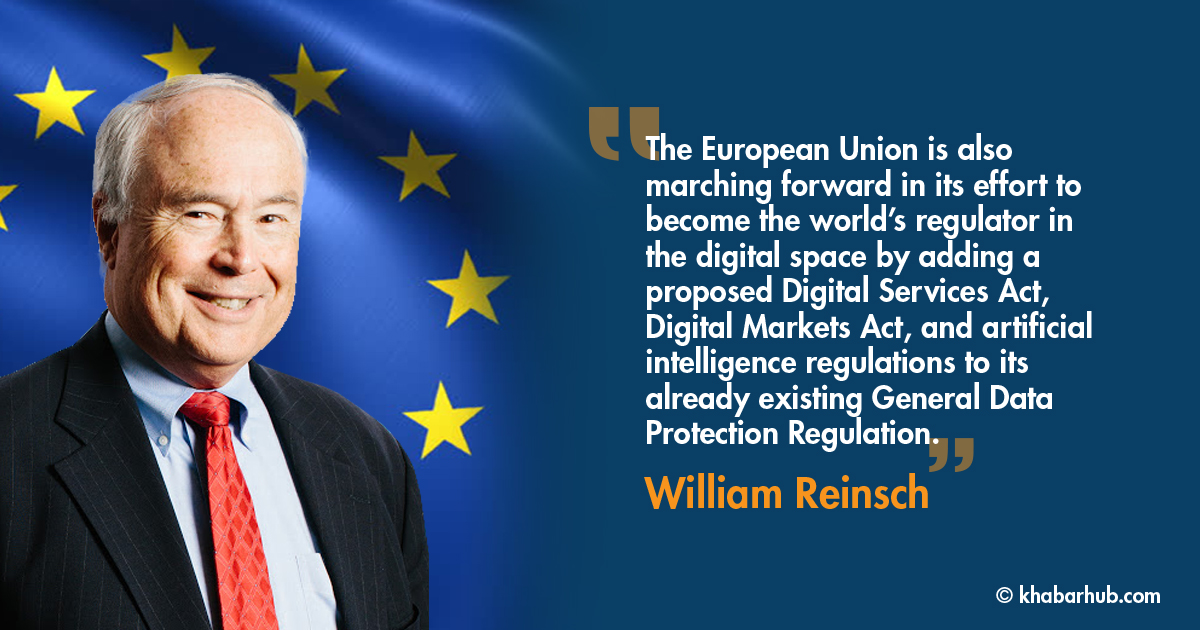While many people are saying that 2021 will be the year of China, just as the past four years have been, I think we may well see our relationship with Europe occupying much of the debate space this year.
There are compelling reasons for improving it, just as there are compelling obstacles to doing so.
First, the relationship is in serious disrepair. President Trump spent the past four years undermining NATO, bullying European leaders individually and at G7 meetings, and both threatening and imposing a variety of tariffs.
Steel and aluminum tariffs are in place, as are retaliatory tariffs growing out of the Boeing-Airbus case. Threatened were tariffs on automobiles and on a variety of other French goods because of its digital services tax.
The collective sigh of relief across the Atlantic after the U.S. election was audible here, and European leaders have been clear they are interested in moving the relationship in a more constructive direction.
Second, the relationship matters. The European Union’s proposal for a reset has had a positive reception here. The president-elect knows Europe—and many of its current leaders—well and recognizes the importance of a good relationship, both for its own sake and also to help him build the coalition he has talked about for meeting the China challenge.
We can expect considerable column space to be devoted to the coalition idea over the next few months—who, how, and why are the obvious questions.
The many equities involved will make reaching agreement much more difficult, and the absence of a clear U.S. position on many of the issues will delay progress, as will the fact that the European Union has thus far shown little flexibility in its positions.
There can be multiple answers to those, but they all rest on advancing the principles of rule of law and democracy, which, in turn, means it will be hard to build a coalition without Europe.
There are also more pragmatic short-term reasons for buffing up the relationship. The United States has had differences with the European Union on trade issues for decades.
Faithful readers of this column will remember my frequent rants about chlorinated chickens as a metaphor for a wide range of regulatory disagreements, but the number and magnitude of the differences seem to be growing.
One of the biggest is the Boeing-Airbus subsidy case, where both sides have won their respective cases at the World Trade Organization and taken retaliatory action.
That issue is moving into its 17th year, but the escalating tariffs have increased the urgency of resolving it. Another is the proposed, and in the French case, implemented, digital services tax (DST), which in every country appears aimed directly at large U.S. companies.
The European Union is also marching forward in its effort to become the world’s regulator in the digital space by adding a proposed Digital Services Act, Digital Markets Act, and artificial intelligence regulations to its already existing General Data Protection Regulation (GDPR).
The latter illustrates the fragility of the EU approach. U.S. companies that deal with EU citizens’ personal data are in an uncertain environment after the European Court of Justice last summer invalidated the Privacy Shield framework and left backup agreements to facilitate data transfers on shaky ground.
The failure of the United States to develop alternative approaches to this and the other digital policy initiatives means the EU regulatory model is rapidly becoming the default position, once again to the detriment of U.S. technology companies.
So, the incentives to resolve the outstanding issues and move the relationship forward are clear. Unfortunately, the path to doing so is complicated.
The European Union has poured cold water on returning to the Transatlantic Trade and Investment Partnership (TTIP) that was launched in the Obama years.
That is a disappointing but pragmatic decision, since there has always been considerable opposition to it in Europe. (U.S. trade skeptics were too busy opposing the Trans-Pacific Partnership (TPP) at the time to focus their ire on TTIP, but they would have gotten around to it eventually.)
That leaves a small ball strategy—a potential series of mini agreements addressing one issue at a time. The Trump administration reached one on lobsters, and the European Union would like to build on that, although it is a pretty thin foundation.
Some issues, like Boeing-Airbus, are fairly discrete and may be susceptible to that, but others—notably the whole panoply of digital regulation issues—are more complicated and raise fundamental issues of competition policy, privacy, and how governments choose to regulate their societies. It’s not just about tariffs anymore.
One issue that might be a catalyst for broader cooperation, however, is climate. The Biden administration is making it a top priority, and the European Union is already well down the path of grappling with serious measures to slow global warming.
Even the DST raises broad issues of the appropriate level of taxation for corporations and how to treat companies doing substantial business in one country when their physical location is elsewhere. Indeed, digital trade is the quintessential global commons issue, by definition crossing all borders and affecting virtually everyone.
The many equities involved will make reaching agreement much more difficult, and the absence of a clear U.S. position on many of the issues will delay progress, as will the fact that the European Union has thus far shown little flexibility in its positions.
Arguing that everything will be fine if we just do it their way is not a path to “yes.” There is a viable path on the DST—the Organization for Economic Co-operation and Development (OECD) process already underway—and new U.S. leadership there might be able to bring it to a successful conclusion, but I am not as optimistic on other issues.
One issue that might be a catalyst for broader cooperation, however, is climate. The Biden administration is making it a top priority, and the European Union is already well down the path of grappling with serious measures to slow global warming.
If the two sides can reach agreement there, particularly on a common approach to border adjustment measures, then there might be hope for progress on the other issues as well.
(William Reinsch holds the Scholl Chair in International Business at the Center for Strategic and International Studies in Washington, D.C.)
Copyright: Center for Strategic and International Studies.









Comment